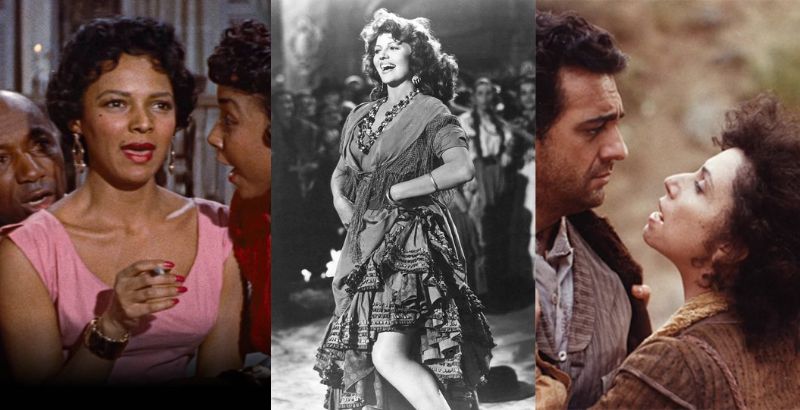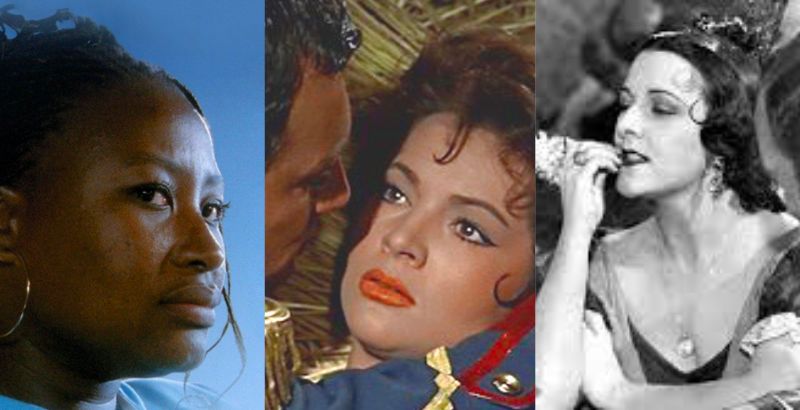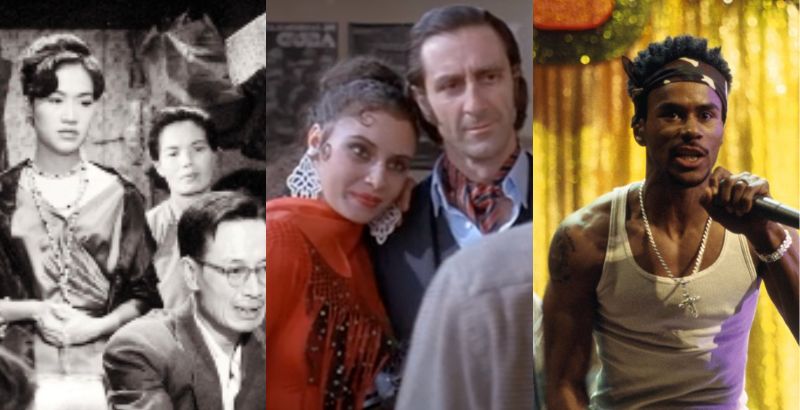
Full spoilers for Carmen (2023) and virtually every other version of this 178-year-old story
Carmen is one of the most adapted stories of all-time, perhaps only second to Dracula. Since the first of the Carmen adaptations from its original 1845 novella by Prosper Mérimée into the famous opera in 1875 by composer Georges Bizet and librettists Ludovic Halévy and Henri Meilhac, storytellers the world over have been fixated on retelling the Carmenic tale over and over on opera stages, in ballet and other dance forms, and especially on film.
Over 120 film versions of Carmen adaptations are known to exist, from the first moving pictures of the late 1800s to transatlantic dueling renditions of the silent era to star-studded retellings of the early sound era. There are several auteur interpretations from the 80s, musical versions reimaged into different languages, cultural contexts, and musical styles, and major box office hits spanning the decades and continents.
Not to mention endless filmed versions of opera, stage, and dance productions. No two iterations of Carmen on film are ever the same, sometimes adapting parts of the novella and the opera in different measure, there are over 60 narrative film editions across more than 100 years of cinema.
Over the past several weeks, I have engrossed myself in 30 of the most important, interesting, successful, and readily available Carmen adaptations. I watched 30 versions, culminating my Cavalcade of Carmens with the terminally misbegotten Carmen (2023). My constant companion was the academic trove of Carmen information, Carmen on Film: A Cultural History by Phil Powrie et. al.. It is an invaluable source of essential contextualization, especially for the versions I was not able to view with English subtitles and for a number of other films I was not able to watch, either because they are non-extant, I could not locate them, or I did not have the time.
Most of the consequential renditions of Carmen from across the globe are readily available on streaming platforms or by VOD in the U.S., although a few required renting or purchasing DVDS to procure, extensive internet sleuthing to discern, VPNs to access, and in one case, a trip to the Library of Congress for a private screening on film.
In all of my viewings of Carmen over and over again, one thing became the most abundantly clear about what makes Carmen, Carmen, and what makes a good Carmenic story regardless of the characters and their context: Carmen is about José as much as it is about Carmen. Their relationship, its dynamics, and their unified fate are what make either of their characters compelling. Without Carmen’s unadulterated whims, her overwhelming charms, and her insistence that she never be anything less than unequivocally free, José is just any other boy masquerading as a man in the garb of authority and with a monopoly on violence.
But without José’s machismo-laden insecurity, his proclivity for violence, and his self-righteous jealousy, Carmen is just a woman deigning to be seen as a person to be loved and not an object for some man’s affection, even as she gladly uses her body and her charm to get her way, whatever her way may be.
What makes a classic Carmen?

At a classic Carmen’s beginning, José is the epitome of a steady man of proper culture. He has a salaried military job and represents dignified society. Carmen represents the day-working, orientalist vision of exoticism and femininity. Being “other,” a gypsey,” makes her intrinsically alluring to everyone she crosses, including those in the audience, but it also makes her less-than the proper Sevillians like José. Neither character is novel unto themselves, but when these two reliable archetypes collide, their characters bend substantially into each others’ shapes. José is emasculated repeatedly, stripped of his dignity and honor, and rendered incapable not only of supporting Carmen but of even supporting himself.
Meanwhile, Carmen is most often a criminal of some sort, conniving and powerful. Even in versions that mirror the novella in revealing her secret husband Garcia in the third act, she remains in control of her own body, her own sex, and her own fortunes. Moreover, Carmen is meant to tear the audience between loving and abhorring her. She’s seductive, but she’s honest. She warns potential lovers from the start that falling in love with her is a dangerous, perhaps deadly game. For much of the first half of the story, we feel bad for her. She’s in love with José only to first have him torn away in Act I and then have him choose to leave her in Act II. But as she’s revealed to be a criminal herself who will not regret having sex with men other than José, sometimes even bearing that secret husband, Carmen becomes the villain.
Carmen’s death at her once-beloved José’s hands, in original and more conservative renditions, ultimately puts both characters back in their proper places as man and woman, as proper citizen and savage outsider, and as innocent and guilty. The conservative moral is that women and foreigners are a corrupting force that needs to be repelled and squashed. Even in more liberal interpretations of the text where audiences are directed to mourn Carmen and detest José in the end, the great tragedy is still that men’s ultimate control over women’s fates is proven again and again through her death.
With this grand history and core principle in mind, I take no pleasure in announcing that Carmen (2023) by Benjamin Millepied is the worst adaptation of the story in nearly 150 years of filmmakers’ global fixation on the classic. Bear in mind that it is also simply a bad film, where not even Paul Mescal’s cute face can save it from being a dimly lit, meagerly acted, confoundingly choreographed, and upsettingly shallow movie. Even more disappointingly, though, the movie fails entirely to understand what makes an interesting Carmen adaptation. It is, frankly, an idea in search of an IP with inklings of genius subversions of the story’s core-most themes. But it fails to execute any of them as it ultimately shirks every fabric of Carmen’s essence in favor of its own (poor) artistic choices. A truly horrendous way to end my Cavilcade of Carmens.
Carmen (2023) begins like they nearly all do, with Aiden (Paul Mescal), our José character, who is a military vet out on a volunteer shift for the border patrol. But the adaptation already finds sharp deviations from either source material as we construct this rendition’s Carmen (Melissa Barrera). To begin, Carmen (2023) shifts the story’s perspective slightly from the typical. In general, a Carmen tale is told from the perspective of José either as a literal narrator or as the primary focal point and original point of view. The story typically starts and ends with José. In this latest adaptation, the story starts and ends with Carmen.
Carmen (2023) focusses way too much on Aiden

While it’s not fair to say that it’s entirely a movie from her point of view—Aiden is still ultimately the one whose vantage is most considered and whose gaze upon Carmen is the viewer’s primary gaze—Carmen’s perspective is more directly considered here than most other versions before it. Carmen adaptations like Joseph Gaï Ramaka‘s 2011 Carmen Gaï and Mark Dornford-May’s 2005 U-Carmen eKhayelitsha are both version that might emphasize their Carmens as the main characters, but the latter offers no backstory and the former offers only a tiny bit of a prelude. In Millepied’s version, we’re told explicitly who Carmen is and what her motives are from the start — something only usually alluded to or revealed later as a gotcha moment to José and the audience.
Although, by rounding out Carmen as a character only to hold still in the grips of a male gaze is ironic. If shifting closer to Carmen’s perspective is meant to “humanize her” or offer some kind of feminist approach to the film, remaining squarely within Aiden’s point of view over her makes those choices come off as patronizing. And it does her character for her own sake no service, either.
Who Carmen is in Carmen (2023) could simply not be less interesting. Firstly, Carmen is not a criminal, as she is in all other adaptations. At least not in any real sense. She crosses the U.S.-Mexico border illegally, which makes her one by default. And I do deeply resent the implication that we’re supposed to see Carmen as a criminal for crossing a border to save her life. But she’s not a smuggler or part of any organized crime group like nearly every other Carmen before her. She’s not even cunning or conniving. She doesn’t use her witts or her body to advantage herself or repay any debts. Instead, she’s just a mourning daughter on the run. She has motivation, but lacks entirely in the vivid personality typical of Carmen.
Carmen has been successfully depicted with all kinds of personalities, for better and worse. Cecil B. Demille’s 1915 Carmen makes clear that she is a hardened and wily criminal from practically the first block of text. Rita Hayworths’ famous turn as Carmen in Charles Vidor’s 1948 The Loves of Carmen similarly villainizes her from the get and implies that she’s up to no good on purpose. Opposingly, she’s written fairly tamely in 1954’s Carmen Jones by Otto Preminger where Harry Belafonte’s Joe and Dorothy Dandridge’s Carmen could even be considered wholesome during their wooing stage. She’s not depicted as just another 50s floozy—she’s genuinely trying to find the right guy. Joe just isn’t it and he can’t handle that. It’s not her fault, it’s his.
Carmen has to be a complicated figure

Carmen has also been successfully written in adaptations as a villain we’re supposed to love, whether for her cunning or for her body. Jean-Luc Goddard’s First Name: Carmen (1983) offers one of the strongest-willed renditions played by Maruschka Detmersas. She’s the clear leader of her criminal enterprise and completely unphased by her tormented José character’s dismay over her sexual conquests.
She literally grabs a man-servant right in front of his face and has sex with him in the next room over just to prove her power over him. Vincent’s Aranda’s 2003 Carmen also makes its titular character a no-nonsense type of criminal whose crimes don’t feel as dastardly as in, say, Peter Brooks’ The Tragedy of Carmen (1983) where she straight up knifes José girlfriend in front of him and he still falls in love with her anyway.
And in one of my favorite versions, The Wild, Wild Rose (1960) by Wong Tin-lam, the Carmen character Deng Zigia (Grace Chang) aka Wild Rose is the most righteous of them all. She gains her José character Liang Hanhua’s (Yang Chang) hatred not because she seeks to do him wrong — she may actually love him more truly than any other Carmen. Instead, she gains his jealousy when she turns to sex work and singing to help her Escamillo-esque friend Old Wang’s (Ta Lei) sick wife (Xiaonong Ma).
Making a charming and heroic Carmen turns José’s demise into as much a tragedy as Carmen’s death. His corruption is of his own making when presented with a Carmen who is maybe not always as pure as the Wild Rose but is at least an intentionally sympathetic character.
Unlike the early iterations of Carmen, aforementioned and otherwise, especially the very conservative Spanish Fanco-era Carmen adaptations Carmen la de Triana (1938) by Florián Rey and A Girl Against Napoleon/The Devil Made A Woman/Carmen la de Ronda (1959) by Tulio Demicheli that paint Carmen as ultimately deplorable despite her appeal, most modern operatic renditions, like Francesco Rosi’s movie version in 1984 or the highly impactful recorded stage versions from Herbert von Karajan in 1967, Franco Zeffirelli in 1978, and the Metropolitan Opera House in 2010, render Carmen as a character we’re supposed to root for, regardless of her criminality or sexuality.
But Barerra’s Carmen has no moral direction. Her quest for freedom in the United States is just, but it’s not morally positive or negative. She doesn’t come to Aidan to take advantage of his power or seek to repay him for his generosity. She just exists, their orbits happen to collide, and Aiden happens to be a decent person. The text is neither politically pro or anti-Carmen in any way. Even my assertion of justice is my own perspective and not outlined in the movie in any way, thereby leaving the relationship and its characters utterly uninteresting as a Carmenic text.
The gaze is muddled in Carmen (2023)

I wish that the film’s perspective was just shifted entirely, letting Carmen be the point of view character and Adrian the object of affection and exoticism. He’s a soft-spoken country boy, a white man who speaks Spanish well but with a terrible accent, and has incredible marksmanship and fighting skill but clearly is reluctant to wield it. It’s a perfect inversion of the José character from boy-seeking-manhood into man-seeking-boyhood. It would be a perfect tool for inverting the story’s typical gaze too. But alas, it’s a squandered quality for neither being the movie’s fixation nor even an overt part of the text.
Not only is the gaze muddled, but all vestiges of Carmen’s sexuality are erased completely from Carmen (2023). The de-sexyfying of the Carmen character and Carmen tale is perhaps the greatest of its cardinal sins. The movie feels intentionally and utterly prudish, barely taking advantage of its hot leads or even giving us so much as a scintilla of sex. The closest thing to a sex scene is basically just some brief topless kissing.
The Carmen character is so synonymous with sex and sex appeal that it has spawned at least three different erotic iterations (Carmen, Baby in 1967, Carmen Nue in 1984, and Kamikaze Hearts in 1986). These are among some of the best Carmen adaptations too, because they recognize that Carmen as a character is meant to be deeply confounding to the audience. Kamikaze Hearts exemplifies this best by being a semi-staged documentary about porn actors in a very Carmenic relationship.
Sharon Mitchell, the Carmen analog, engrosses her partner Tigr, the José analog, in a fantasy, as any Carmen does. Sharon is always the same mysterious figure, on and off-screen. She says herself, she doesn’t know any other way to be but to be her character at all times. And because the movie is also semi-staged, we don’t know how much of their relationship is genuine love and how much of Tigr’s jealousy is true. Being unable to tell who Sharon truly is other than an irresistible sex figure reminds us that Carmen is not actually meant to be discerned. Her love of José could be genuine or it could be a means to a devious end. Not being certain is what makes her so intriguing every time.
One of the closest Carmens to 2023’s rendition might be Beyoncé Knowles’ in Carmen: A Hip Hopera (2001). She doesn’t have an extensive backstory, but they’re akin because they both have among the strongest non-criminal and non-sexual motivations. Beyoncé’s version has big career aspirations in Hollywood, but her José, Hill (Mekhi Phifer) is largely a tag-along to her. Like Barerra’s, Beyoncé’s Carmen is not motivated to use her José to her advantage. She like so many Carmens is merely grateful for Hill saving her from jail. For that, in this film, his character becomes a flat, disinteresting mope.
The role of masculinity in Carmen

José has a long history in Carmen adaptations of being depicted as a clinger-on. Godard’s José character is borderline abusive, serving no value to her or her crew but sticking around anyway because he thinks he has some kind of possession over her. The José character of Luigi Bazzoni’s Man: Pride and Vengeance is barely even interested in Carmen, and neither is she interested in him. He just makes a series of mistakes that gets him stuck in her crew. The attraction comes later.
This adaptation, among my favorite Carmen adaptations, reminds us that in the original libretto and many Carmen adaptations thereafter, Carmen is merely being nice to José for saving her from prison the first time they reunite. She’s not making a lifelong commitment, and José, especially in his most extreme sexual depiction as a virgin in Aranda’s Carmen (2003), is too sexually naïve to understand otherwise.
2023’s Aiden is neither naïve nor lovestruck. He’s not in the first relationship of his life. He’s not head over heels for this woman he’s only just met the instant they meet. Their passion comes from seemingly nowhere besides a shared trauma, which in normal movie magic would be fine, but in Carmen leaves their relationship meaningless. And it means it has no stakes. He can’t be jealous if he’s not madly in love. He can’t be betrayed if she never makes him any promises in the first place.
And Aiden’s masculinity, one of José’s most essential traits, can’t be challenged if Carmen isn’t making him feel emasculated. Violence and machismo are so integral to the Carmenic narrative. In nearly all versions, José is predisposed to violence by nature of him being a soldier. One of the standout exceptions is Carlos Saura’s 1983 Carmen, another of the greatest Carmen adaptations, where the characters stage a flamenco version of Carmen within this already deeply Carmenic tale. Here, the José character Antonio (Antonio Gades), like Aiden, performs a lot of dance on-screen (although Gades does so substantially better given he is a professional and Mescal is known for explicitly not being a good dancer).
Antonio attempts to perform masculinity through his dancing but is not only emasculated by Carmen (Laura del Sol) to both their and the audience’s great sexual pleasures. But at least to my American eye, it’s dance is also a highly feminized art in the first place. The way Antonio’s body contorts and his emotions are laid bare in dance delivers a difficulty in taking him as seriously manly as his gruff and criminal Escamillo character counterpart Paco (Paco de Lucía), who is also Carmen’s husband in this version, though not usually.
While many Carmen adaptations possess intricate dance scenes, especially Spanish Carmen adaptations with their long flamenco interludes, Saura’s is the most about dance itself, which forces Millepead’s dance film to contend with the fact that, if Aiden is already an effeminate character, and dance is effeminate, then the dance is purely artistic rather than transgressive.
In versions that closer resemble the novella, José kills multiple people, sometimes as early on as a peer by manslaughter in his youth, but often increasingly higher ranking officers or sexual adversaries. Carmen Nue astutely portrays the escalating violence and its relationship to his being man enough for Carmen as he seeks out combat with foes of greater and greater manliness to their deaths. He can’t be a worthy sexual partner to Carmen unless he keeps up his kill streak.
José’s violence

Aiden is clearly an ex-soldier suffering from post-traumatic stress. But none of his characterization or proof that he can be violent when necessary ever leads to the typical violence you’d see pointed toward Carmen as time goes on. I fear Millepead is just simply afraid of putting his Carmen in anything resembling a vulnerable situation while trying to repeatedly prove that Aiden doesn’t need to be violent to be a man.
But he’s not rendered a mope either, like Hill is in the Hip Hopera, like Joe is in Carmen Jones, or like José is in the Met’s staged rendition. These Josés have their machismo stripped away to the point of complete embarrassment as they sulk around during the third act in hiding. Aiden, however, doesn’t mope. He feels compelled to action and takes on a big prize fight so they can have enough money to keep on the run.
And worse yet, it’s not a call to violence as a means of proving his worth to Carmen. It’s merely self-preservation. He has a skill he is willing to put to use to protect himself and protect this person in his care for whom he is growing infatuated, if not in love, if we’re being generous. At no point does Carmen (2023) question Aiden’s masculinity.
If anything, this final act of violence goes so against his character and his desires as to make it the ultimate act of actual, positive manliness. It would maybe be the hottest scene in the movie if it weren’t for the fact that it is so pathetically choreographed and in possession of rap lyrics worse than anything in even the objectively bad Hip Hopera.
With a Carmen whose attempts to give her some kind of prudish version of agency leave her completely uncompelling and a José character whose trials through masculinity and trauma are self-imposed and completely stagnant, it’s almost obvious in retrospect that Carmen (2023) could end only one way: in utter disappointment. Because she doesn’t even die in the end. She couldn’t! What would killing Carmen do for this story besides make her another woman murdered by violent men for no reason whatsoever?
While not the first Carmen to survive the fate prescribed to her by her creator in 1845, it is the most meaningless. One of the earliest extensive reimaginings of the Carmen tale, Carmen (1934), is a silent silhouette film by Lotte Reiniger, the filmmaker whose most famous of her many adaptations is The Adventures of Prince Achmed, adapted from 1001 Arabian Nights. In this Carmenic rendition, the titular character becomes the hero, herself conquering the bull and riding off upon it at the movie’s conclusion. It’s an epic end to an otherwise twisted story we thought we knew.
Carmen must die

Every time Carmen dies at José’s hands, it’s a tragedy. It’s a tragedy either because she is being scapegoated on behalf of a conservative worldview that women and “others” ought to stay in a certain place and men ought to stand in a certain place above them, or, it’s a tragedy because no matter how liberated, how cunning, and how sexually free Carmen is, she still cannot escape the fate men have deemed hers.
I suppose that killing Aiden instead of Carmen is almost novel. It pokes at a message that the world has no room for men who choose to abdicate traditional masculinity. But it never tests that theory through jealousy or betrayals by Carmen. Or perhaps it’s novel that he dies to save her life. Carmen’s freedom is certainly worth something. To have killed Barerra’s Carmen would have been meaningless and un-novel. But not killing her is still just cowardly.
A modern adaptation of Carmen could be so powerful in stating that 150 years later, we’re still obsessed with making examples of women who did nothing wrong other than try to thrive in a cruel world. One could be so impactful using the same type of Aiden who shies away from the typical trappings of masculinity but nonetheless succumbs to his evident trauma-induced survival instincts and inadvertently renders Carmen dead.
But alas, we are left with a Carmen that adds nothing to the canon because it is, in fact, a Carmen in name only and not a meaningful exploration of the tale’s core-most interesting questions: Who is Carmen, who is José, what do they want from the world, and what happens when they collide?






